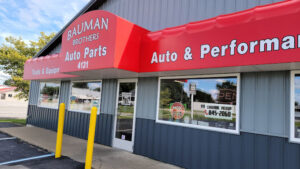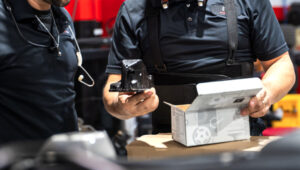“With one seemingly inconsequential spill, this poor guy could end up losing his business, his personal assets and who knows what else happens,” says Tom Langer
Consider this. There is a spill from your oil storage tank. Or, maybe a spill from a fuel-delivery at your gas station. Or it could be a drum of cleaning fluid tips over in your warehouse, or in a shop. Could be a lot of things. Did you know any of these could destroy your business and quite possibly your personal finances?
Recently an auto repair shop had a 350-gallon oil storage drum tip over while some employees were moving it back behind the shop. The oil spilled. It went down into a storm system. Then it traveled all the way to a storm water retention pond, where it was noticed by someone who saw the film and smelled the oil.
They called 911 with both the fire department and police responding — then a hazmat team arrived. Out went the retention booms and matting. It was a mess. Then the state Department of Natural Resources (DNR) was brought into play.
At this point, it appears the shop owner has no idea this is happening. But, as we all know, the shop owner who signs the business papers is responsible for whatever happens even if it’s someone else’s fault. Though the spill seems initiated by employees, the owner is the one who’s at risk.
While I am no lawyer, and the rules in your state may be slightly different, in his state, in my opinion, the owner is in HUGE trouble. Consider:
- The owner was legally responsible to report the spill immediately to authorities.
- The owner was responsible to mitigate the loss, such as blocking the oil’s path to the storm water system.
- The DNR, the remedial service provider sent by the state, along with the other services involved, are looking to the owner to get paid.
- Owners of the homes around the area may choose to bring civil suits. I’m sure there is no shortage of lawyers who would take the job.
- If the corporate shell is pierced, and it may be depending on the finding of personal liability that may follow, the owner’s home and other assets may be on the line.
- And if there is a personal liability finding, the insurance may very well choose to stay out of this claim. Especially any personal legal work for the owner.
Well, in the end, you get the picture. This guy is likely up the river in his canoe with no paddle in sight. With one seemingly inconsequential spill, this poor guy could end up losing his business, his personal assets and who knows what else happens.
All of these experiences are awful to contemplate. But from the ashes, all of us can learn from what has happened and avoid this type of thing in our own shops and businesses. Here are a few tips on how to avoid your business from circling the drain.
First, realize that the business/company is your responsibility if your name is on the line and out front on the sign. Your employees may not ultimately be held responsible. They may be involved and part of any process, but you sign the settlement papers and checks. As a result, the first thing that needs to be done is to establish a spill procedure. Obviously, we’re not talking about spilling something on the floor and sweeping it up with some kitty litter.
First, have a chat with your local fire department. Ask when it’s time to call them. What size or type of spill will trigger a call for them? It is important to establish this information so that you are able to create a short, simple plan that you’ll post on the bulletin board and for training everyone on your staff.
With this information in hand, create a simple flow chart document. For example:
- Right away they should let you know what is happening so that you are able to make decisions and take action.
- Provide some first-aid training in advance, set up an eye-wash station and tag materials. When I was young and working in a machine shop, I was cleaning a cylinder head and had cleaning fluid run down on a leg of my pants. That night my leg felt like it was on fire! Sure was red and dry. Clean, too!
- In your absence, be sure your whole crew has a simple guideline and the proper contact number to call the fire department prominently displayed. That may be 911 or maybe a spill-reporting line. It would strike me that you want to be calling right away if the spill appears large enough to breach the floor drains or is headed for the drains. I spoke with a city utility person who, if understood by this writer correctly, suggested that utilities do have the ability to track leaks in storm or sewer drains back to their source, such as seems to have happened in our earlier example.
- While waiting for response, mitigate the spill if it can be done safely. Stop as much as possible from hitting the drain. Get the drum righted safely or the stopper back in it. If it’s cracked, roll it over so the crack faces up. If the spill is a flammable, such as thinner or other highly flammable liquid, or a lung irritant, clear the building until the fire department tells you it’s OK to go back in to begin cleanup. Labeling the drums, etc., as to flammability is always a great idea.
- Speak with your legal counsel as soon as possible so they are aware of what happened. Do not speak to reporters. Do not admit guilt or how badly you feel. Respond with answers only to the authorities involved and your attorney. Don’t guess or conjecture as to how something happened unless you know concretely and its part of the process of handling the spill.
These points are only a start. The work to pull all of this together is on your shoulders, which already are likely carrying a heavy load. You could hire a spill remediation firm or ask someone from the fire department to help. But this is one of those cases where not taking action may well cost you big one day.
At a young age, industry veteran Tom Langer started detailing cars for his family’s dealerships, which then led to work in the jobber and warehouse business, along with a machine shop and auto body shop. He held a variety of positions with an auto parts manufacturer for 10 years, and remained in the industry working with shops, warehouses and manufacturers in research and more.











Comments are closed.